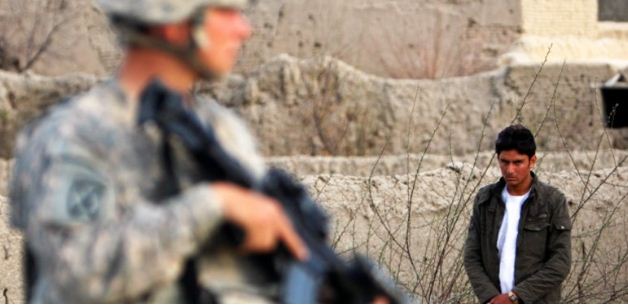After quickly overrunning smaller administrative districts and provincial hubs, the Taliban on Sunday entered the Afghan capital Kabul and seized power, dramatically taking the country’s reins for the first time in almost 20 years.
The group’s rapid advances took many by surprise, with US President Joe Biden later acknowledging that his administration was caught off guard by the rapid deterioration of the Afghan military.
As late as last month, however, he had expressed public confidence that the US-trained Afghan National Security Forces had “all the tools, training, and equipment” to hold off a Taliban takeover of the country.
He said he had trust in the capacity of the Afghan military, calling it “better trained, better equipped, and more competent in terms of conducting war” than the Taliban.
In words that may come back to haunt him, Biden said the Afghan government and leadership “clearly have the capacity to sustain the government in place.”
But instead, the Taliban took over Afghanistan in a matter of weeks, even before the complete withdrawal of foreign troops from the war-torn country. The government quickly folded, with President Ashraf Ghani other key officials fleeing for safety abroad.
Yet over the last two decades, the US spent a whopping $89 billion to train and equip the Afghan military. So, the question remains: Why did Afghan soldiers collapse so quickly in the face of the Taliban advance?
LOST FAITH, CORRUPTION, WEAK LEADERSHIP
Rich Outzen, a retired US colonel who has worked in Afghanistan, chalked up the surrender to a lack of “sustainment support” (air support, logistics, transportation, communications) once the US military and contractors left, “weak political leadership,” and “insufficient national ethic.”
“Commanders and troops lost faith in Kabul and wouldn’t fight for it in the end,” he told Anadolu Agency. “Corruption also affected soldiers’ pay, morale, and availability,” he said, adding that there were “ghost” soldiers as well-those who did not report to work but were on the books “so a commander could pocket the pay.”
“Corruption in logistics and contracting was rampant too,” said Outzen, now a geopolitical consultant.
Reiterating that a lack of air support is one of the factors leading to Afghan forces’ failure, Murat Aslan, a political scientist at Turkey’s Hasan Kalyoncu University, said that in a country like Afghanistan, scattered across the Hindu Kush mountains, the ground forces were heavily dependent on this air support, which could only be provided by the US.
Personnel “retreated because they could not feel the backing of the central (Afghan and US) forces,” he told Anadolu Agency. “This is a military interpretation of the overall collapse.”
Aslan added: “The failure on the ground is not only about the inability of Afghan forces but the psychological effect of the US withdrawal.”
According to him, the Afghan forces were “more motivated to have a job rather than a committed stance to (serve) the country”-perhaps in contrast to the more dedicated and driven Taliban.
He also said that the personnel were selected on the basis of ethnicity rather than merit.
FUTURE OF TIES WITH AFGHANISTAN
Asked how the world, especially the US, will deal with the country’s new Taliban leadership, Outzen said the US “cannot develop a close relationship with the new government.”
“It will issue warnings and threats to keep them from crossing red lines on terrorism (open support or tolerance of al-Qaeda, etc.) It will criticize human rights abuses such as the repression of women and minorities,” he explained.
“For the remainder of the Biden administration, they will try to minimize frictions, though, and avoid public scrutiny of what many consider a massive policy and strategy failure,” he argued.
Aslan, on the other hand, went on to say that in fact the Taliban were first legitimized by the February 2020 Doha agreement with the US, adding that the “absence of a legitimate government in Kabul and military enforcement of Taliban makes them legitimate.”
POWER VACUUM IN AFGHANISTAN
Many believe that the departure of US troops from Afghanistan has left a power vacuum in the country that may be filled by other major powers, especially China and Russia.
Telling how just last month China accepted a visiting Taliban delegation and promised them support, to the detriment of the Muslim Uyghurs of northwestern China, Aslan said this effectively means “China pledged recognition to the Taliban.”
China has already thrown its weight behind an “Islamic government” in Afghanistan, urging the Taliban to honor their commitments for a negotiated settlement in the country.
Pointing out to Russia’s relative silence since the fall of Kabul, Aslan said this is “because they see that there’s an opportunity in the existent gap after the withdrawal of the United States.”
“It is crucial that the international community first agrees on a solid agreement on how to deal with the Taliban at the expense of recognition,” he said.
He added that all actors, including Turkey, Pakistan, and Iran, “can then urge Taliban … to comply with the universal norms, and international politics.”
Alluding to Afghanistan’s reputation as the “graveyard of empires,” Outzen said, “Afghanistan is not the sort of place where any external power has ever dominated or even profited for an extended period of time.”
But, he added: “Russian and Chinese influence will rise somewhat, as that of the US disappears.”
He said that Turkey’s role will be interesting, given its close ties with neighboring Pakistan, which is said to have an influence over the Taliban, and also as a longstanding member of NATO.
But he cautioned that the war may not simply end, as the Taliban have “not shown the ability to run a large country or economy,” and foreign influence will depend upon whether the “situation stabilizes or sparks new fighting.”

















